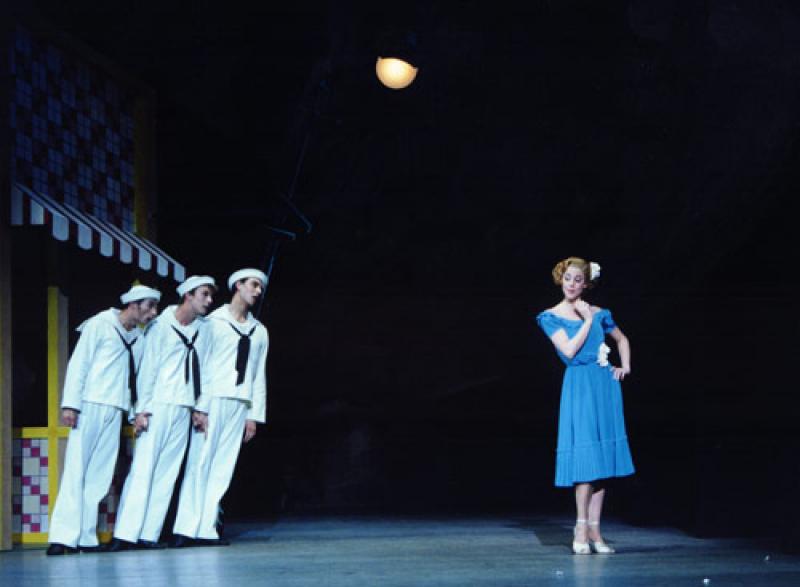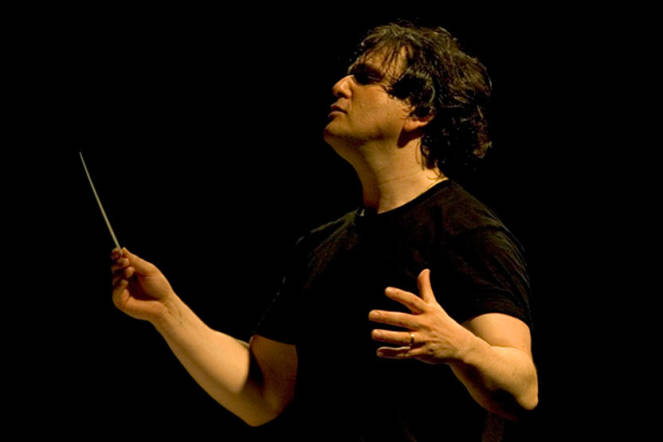Antonacci, ROHO, Pappano, Royal Opera House | reviews, news & interviews
Antonacci, ROHO, Pappano, Royal Opera House
Antonacci, ROHO, Pappano, Royal Opera House
Nothing deep, but plenty of glitter as the Covent Garden pit band hits the stage

Few conductors would think of putting Bernstein’s comic-sexy Fancy Free ballet and the orgasmatron of Scriabin’s The Poem of Ecstasy together in a concert's second half. In fact I’ll wager, without research, that it’s never been done before.
It will now be an annual event, Pappano told us before the music began – hardly enough, but it’s a start. He explained that his aim was to give lush and/or impressionistic context to Szymanowski’s Król Roger, which opened on Friday. That still left Fancy Free as the odd one out, unless it was there to show how dance music could sound in 1944, nearly two decades after the Polish composer’s Dionysiac dithyrambs. In fact the split was really between second-rank scores in which sound matters more than substance – Chausson’s Poème de l’amour et de la mer, Scriabin’s symphonic extravaganza, and, until the Royal Opera production maybe blows me away and changes my mind, Szymanowski's opera maybe fits that category too – alongside sure-footed works by real masters.
 The two Ravel impressions which launched the concert perfectly summed up the facets of dream and dance. “Une Barque sur l’océan” is so shimmeringly, evasively conjured by the supreme orchestrator that you’d hardly believe it could have first been conceived for piano, in the suite Miroirs. Pappano (pictured above) has always been a master of perfumed French refinement, applying it to the sensitive moments of Puccini’s Madama Butterfly and the second act of Wagner’s Tristan und Isolde, so the perfect billowing came as no surprise. The orchestra had to work extra hard in the clear but uncushioning environment of the Royal Opera House, and while being onstage here isn’t as much of a second-best to the pit as it is in the Coliseum – witness ENO’s recent Sweeney Todd – it does mean that the woodwind are more distant than they would be in either of London’s main concert halls. Still, they pulled it off in stilling a restless audience within minutes.
The two Ravel impressions which launched the concert perfectly summed up the facets of dream and dance. “Une Barque sur l’océan” is so shimmeringly, evasively conjured by the supreme orchestrator that you’d hardly believe it could have first been conceived for piano, in the suite Miroirs. Pappano (pictured above) has always been a master of perfumed French refinement, applying it to the sensitive moments of Puccini’s Madama Butterfly and the second act of Wagner’s Tristan und Isolde, so the perfect billowing came as no surprise. The orchestra had to work extra hard in the clear but uncushioning environment of the Royal Opera House, and while being onstage here isn’t as much of a second-best to the pit as it is in the Coliseum – witness ENO’s recent Sweeney Todd – it does mean that the woodwind are more distant than they would be in either of London’s main concert halls. Still, they pulled it off in stilling a restless audience within minutes.
“Alborada del gracioso” sprang Pappano’s nimble way with dance music on us, with some especially impressive fast-articulating trumpet work, though that section had an off-time in Bernstein’s Fancy Free later in the concert. This, too, flew along, the thin plotline of three sailors and two girls in a New York bar carried by Bernstein’s unceasing rhythmic élan and his insouciant nods to jazz, with pianist John Alley excellent in cocktail-hour mode. Why, though, no juke-box Billie (or Lenny) singing “Big Stuff” at the beginning? Much of the ballet’s thematic material depends upon it, so that was a loss. And the big stomp didn’t exactly expand to whoop as it did when Bernstein conducted his own tribute to Strauss’s Der Rosenkavalier. The mode otherwise, though, is freed-up Stravinsky, as Pappano’s tight corners and bright primary colours emphasized, especially in the Pas de Deux.
 Languid orchestral phrases were perfectly, not over-lingeringly caressed in the Chausson, set to rather feeble fin-de-siècle poetry by Maurice Bouchon. The “amethyst sea” was reflected in the lighting of the Opera House dome, the restless ocean's fluctuations triumphing against the grain of the woody onstage set, the desolate barcarolle between the two settings hypnotically perfect. For a voice to match, a more opulent, luminous tone than Anna Caterina Antonacci’s (the soprano pictured above) would have been needed, though her open middle range – think Régine Crespin without the same degree of sensuousness – caught the French text’s fugitive visions well and she undulated to just the right degree to the orchestra’s strains.
Languid orchestral phrases were perfectly, not over-lingeringly caressed in the Chausson, set to rather feeble fin-de-siècle poetry by Maurice Bouchon. The “amethyst sea” was reflected in the lighting of the Opera House dome, the restless ocean's fluctuations triumphing against the grain of the woody onstage set, the desolate barcarolle between the two settings hypnotically perfect. For a voice to match, a more opulent, luminous tone than Anna Caterina Antonacci’s (the soprano pictured above) would have been needed, though her open middle range – think Régine Crespin without the same degree of sensuousness – caught the French text’s fugitive visions well and she undulated to just the right degree to the orchestra’s strains.
Dream had the last word over dance in the final apotheosis of Scriabin’s decadent imagination. I guess we had to imagine Bernstein's sailors in New York taking themselves off to an opium den and succumbing to repetitious hallucinations. Even Pappano’s justifiably fleet way with the score couldn’t conceal the fact that, in thrall to sonata form, Scriabin stops and starts his path to consummation at least three times too often. Personally I’d have liked a bit of the vibrato applied to the Bernstein turned on here in the famous trumpet solos, but they coasted effortlessly above the orchestra and the final blaze, hammered to victory by an imposing iron bell, duly wowed an audience refreshingly composed of all ages.
Next page: listen to Billie Holiday sing the original version of Bernstein's "Big Stuff" not heard last night
Billie Holiday sings Bernstein's "Big Stuff" in 1946
rating
Explore topics
Share this article
The future of Arts Journalism
You can stop theartsdesk.com closing!
We urgently need financing to survive. Our fundraising drive has thus far raised £33,000 but we need to reach £100,000 or we will be forced to close. Please contribute here: https://gofund.me/c3f6033d
And if you can forward this information to anyone who might assist, we’d be grateful.

Subscribe to theartsdesk.com
Thank you for continuing to read our work on theartsdesk.com. For unlimited access to every article in its entirety, including our archive of more than 15,000 pieces, we're asking for £5 per month or £40 per year. We feel it's a very good deal, and hope you do too.
To take a subscription now simply click here.
And if you're looking for that extra gift for a friend or family member, why not treat them to a theartsdesk.com gift subscription?
more Classical music
 Uproar, Rafferty, Royal Welsh College, Cardiff review - colourful new inventions inspired by Ligeti
Unfussy professionalism from Wales-based new music ensemble
Uproar, Rafferty, Royal Welsh College, Cardiff review - colourful new inventions inspired by Ligeti
Unfussy professionalism from Wales-based new music ensemble
 Attacca Quartet, Kings Place review - bridging the centuries in sound
Grammy-winning quartet bring more American punch than Gallic je-ne-sais-quoi to Ravel
Attacca Quartet, Kings Place review - bridging the centuries in sound
Grammy-winning quartet bring more American punch than Gallic je-ne-sais-quoi to Ravel
 Manchester Collective, RNCM review - exploring new territory
The string quartet – plus percussion and electronics – goes on a journey
Manchester Collective, RNCM review - exploring new territory
The string quartet – plus percussion and electronics – goes on a journey
 Bavouzet, BBCSO, Stasevska, Barbican review - ardent souls in mythic magic
Vivid realisation of fantastical masterpieces by Bartók, Ravel and Janáček
Bavouzet, BBCSO, Stasevska, Barbican review - ardent souls in mythic magic
Vivid realisation of fantastical masterpieces by Bartók, Ravel and Janáček
 Levit, Budapest Festival Orchestra, Fischer, RFH review - anger unleashed, fantasy finessed in Prokofiev
Instant communication from Berlin-based pianist and Hungarian army of generals
Levit, Budapest Festival Orchestra, Fischer, RFH review - anger unleashed, fantasy finessed in Prokofiev
Instant communication from Berlin-based pianist and Hungarian army of generals
 A Form of Exile: Edward Said and Late Style, CLS, Wood, QEH review - baggy ferment of ideas and sounds
Superlative actors and musicians in an over-ambitious event running to three hours
A Form of Exile: Edward Said and Late Style, CLS, Wood, QEH review - baggy ferment of ideas and sounds
Superlative actors and musicians in an over-ambitious event running to three hours
 BBC Philharmonic, Bihlmaier, Bridgewater Hall, Manchester review - an International Women's Day special
Spotlight on today’s composers and one of their sisters from the past
BBC Philharmonic, Bihlmaier, Bridgewater Hall, Manchester review - an International Women's Day special
Spotlight on today’s composers and one of their sisters from the past
 Sheku Kanneh-Mason, Czech Philharmonic, Bychkov, Barbican review - from Russia, with tough love
Cellist, conductor and a great orchestra play Shostakovich for today
Sheku Kanneh-Mason, Czech Philharmonic, Bychkov, Barbican review - from Russia, with tough love
Cellist, conductor and a great orchestra play Shostakovich for today
 Classical CDs: Funeral marches, festivals and film noir
Choral music, solo piano recitals and the best violin concerto you've never heard
Classical CDs: Funeral marches, festivals and film noir
Choral music, solo piano recitals and the best violin concerto you've never heard
 Mahan Esfahani, Wigmore Hall review - shimmering poise and radical brilliance
Magnificent demonstration of a lifelong dedication to the harpsichord
Mahan Esfahani, Wigmore Hall review - shimmering poise and radical brilliance
Magnificent demonstration of a lifelong dedication to the harpsichord
 Gromes, Hallé, Chauhan, Bridgewater Hall, Manchester review - new concerto and music of triumph
Spirit of Germany in the 1930s captured in Herz’s tense and despondent work
Gromes, Hallé, Chauhan, Bridgewater Hall, Manchester review - new concerto and music of triumph
Spirit of Germany in the 1930s captured in Herz’s tense and despondent work
 Helen Charlston, Sholto Kynoch, Temple Church review - fine singing, powerful stage presence
Coups de théâtre in a well-constructed programme
Helen Charlston, Sholto Kynoch, Temple Church review - fine singing, powerful stage presence
Coups de théâtre in a well-constructed programme

Add comment